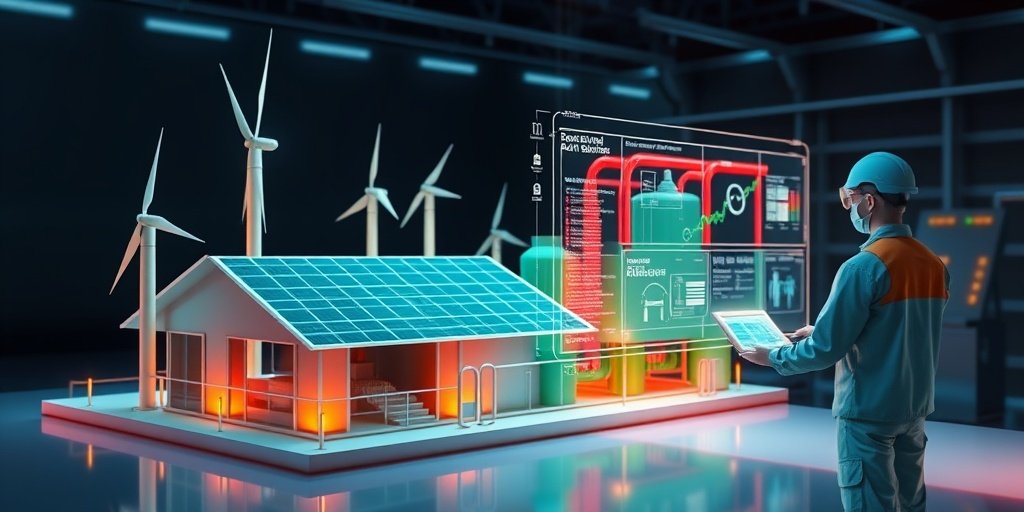⚡ Quick Summary
This review explores how Industry 4.0 technologies such as AI, machine learning, and the Internet of Things are enhancing calorimetry and heat transfer in renewable energy systems. The integration of these technologies promises improved thermal efficiency and real-time monitoring across various renewable energy applications.
🔍 Key Details
- 📊 Focus Areas: Solar, wind, geothermal, and bioenergy applications
- ⚙️ Technologies Discussed: AI, machine learning, IoT, digital twins, blockchain
- 🔍 Key Challenges: Computational demands, data security, policy gaps
- 🔮 Future Directions: Hybrid AI-physics models, explainable AI, long-term performance validation
🔑 Key Takeaways
- 🌟 Industry 4.0 technologies are revolutionizing renewable energy systems.
- 🤖 AI-driven models optimize complex heat transfer behaviors.
- 📡 IoT frameworks enable continuous calorimetric data acquisition.
- 🛠️ Digital twins support virtual simulations for better system design.
- 🔒 Blockchain ensures data security in energy systems.
- ⚠️ Key challenges include computational demands and policy gaps.
- 🔄 Future research should focus on hybrid models and standardization frameworks.
- 📅 Study published in iScience, 2025.

📚 Background
The transition to renewable energy sources is critical for sustainable development. However, optimizing the efficiency of these systems remains a challenge. The advent of Industry 4.0 technologies offers new opportunities to enhance calorimetry and heat transfer, which are essential for improving the performance of renewable energy systems.
🗒️ Study
This review article, authored by Atofarati EO and Enweremadu CC, examines the integration of various advanced technologies in renewable energy systems. It highlights how AI, machine learning, and other digital innovations can significantly improve thermal efficiency and enable real-time monitoring, thereby supporting predictive maintenance across different energy applications.
📈 Results
The findings indicate that the application of AI-driven models can lead to substantial improvements in heat transfer behaviors. Additionally, the use of IoT frameworks allows for continuous data acquisition, which is crucial for optimizing system performance. The review also identifies significant challenges, including the need for enhanced computational capabilities and robust data security measures.
🌍 Impact and Implications
The integration of Industry 4.0 technologies into renewable energy systems has the potential to transform the sector. By improving thermal efficiency and enabling real-time monitoring, these advancements can lead to more reliable and sustainable energy solutions. The implications extend beyond energy efficiency, potentially influencing policy and regulatory frameworks as well.
🔮 Conclusion
This review underscores the transformative potential of Industry 4.0 technologies in enhancing calorimetry and heat transfer for renewable energy systems. As we move forward, focusing on hybrid AI-physics models and standardization frameworks will be essential for the reliable deployment of smart thermal management systems. The future of renewable energy looks promising with these innovations!
💬 Your comments
What are your thoughts on the integration of advanced technologies in renewable energy systems? We would love to hear your insights! 💬 Leave your comments below or connect with us on social media:
Industry 4.0 enabled calorimetry and heat transfer for renewable energy systems.
Abstract
The integration of the fourth industrial revolution technologies, including artificial intelligence (AI), machine learning (ML), the Internet of Things (IOT), digital twins, and blockchain, is advancing calorimetry and heat transfer in renewable energy systems. This review examines how these technologies improve thermal efficiency, enable real-time system monitoring, and support predictive maintenance across solar, wind, geothermal, and bioenergy applications. AI-driven models are discussed for optimizing complex heat transfer behaviors, while IoT frameworks facilitate continuous calorimetric data acquisition. Digital twins support virtual simulations, and blockchain ensures data security. A comprehensive evaluation of recent research identifies key challenges such as computational demands, data security, and policy gaps. The article proposes future directions such as developing hybrid AI-physics models, enhancing explainable AI, conducting long-term performance validation, and standardization frameworks to enable the reliable deployment of smart thermal management systems for renewable energy.
Author: [‘Atofarati EO’, ‘Enweremadu CC’]
Journal: iScience
Citation: Atofarati EO and Enweremadu CC. Industry 4.0 enabled calorimetry and heat transfer for renewable energy systems. Industry 4.0 enabled calorimetry and heat transfer for renewable energy systems. 2025; 28:112994. doi: 10.1016/j.isci.2025.112994